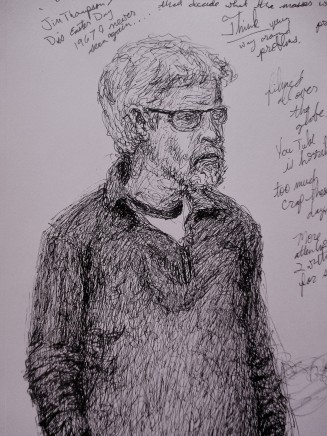
Neil Hollander is a multidisciplinary artist, writer and director who works as a partner for the New York film company, New Wave and currently lives in France. Among having worked many different occupations, Neil has gone around all over the world shooting documentary films on a large variety of subjects such as sailing, world hunger, opium production in southeast Asia, and even a film about the American hobo where him and his crew actually rode freight trains and slept under bridges for several months to film the movie. He says he likes to film what he calls “real society”. I went to a talk that Neil gave in the Media Arts building on Fri, Oct 20th before his evening world premier of his new film “Who Killed Jim Thompson” at Ragozzini Hall on the Lane Community College campus. Neil showed clips and discussed several of his films with a small audience and answered questions afterward.
Neil is an older gentleman who is born in 1948, but when he stepped before the small crowd in the room I could see a swaggering young man with a James Dean style of rebelliousness in his nature. His first words to the audience were memorable: “My advice to you is do not become a film maker.”
Neil went on to support his argument by talking about how only a very small percentage of people get to choose what the viewing public gets to watch. He states that institutions such as Hollywood are extremely biased and selective and want to have complete control over the market. He puts much emphasis into this by using the term “picky snobs” to describe them. He says He uses his film “The Last Sailors” as an example. The film is about different sailors around the globe and narrated by the famous Orson Wells. In this example he talks the difficulty of trying to sell the film to different companies. He talks about one woman in France who would not show his film because she had a severe dislike of boats.
When Neil talked about his style and methods about writing and directing he head the enthusiasm of a child at play. “I profess that I like to use as little money as possible when I am making a film.” He states with candor. He continues to give examples of how him and his crew would get into seemingly impossible places to get into with very little money by hanging out and making friends with the local people of wherever they wanted to shoot footage. They would also save money by renting filming studios in different cities in other countries such as Canada or Thailand.
Neil’s talk was lively and interesting. He had a lot of things to say about the media film industry and gave good advice such as knowing who your audience is, and how important it is to pay attention to good script writing. I had a good talk and connected with Neil after he finished speaking to the audience. It can be difficult to explain, but, there is a free spirited nature that is shared among artists that defies all boundaries and rules. A spirit that will not suffer to be put into a box, or cage, but has to be free to create. Neil Hollander certainly has that rebellious free spirit. We discussed our own lives and artistic endeavors for a good while before parting ways. Neil Hollander is an excellent example of an independent film maker making his own mark on the world of film.
By Jason dallas
